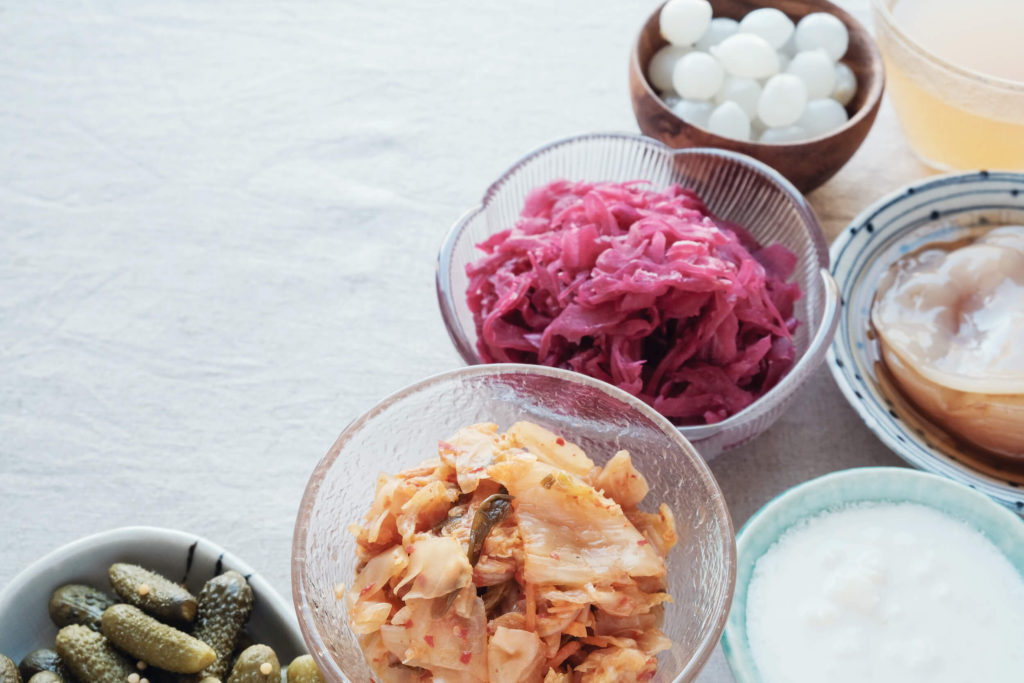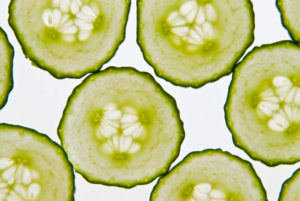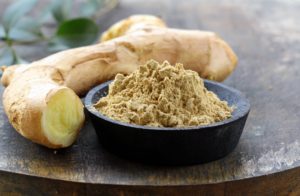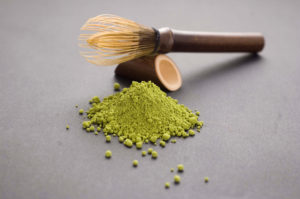Chances are good that you’ve at least heard about probiotics—the “healthy bacteria” that can help our human bodies stay healthy. But maybe you’re not entirely clear about whether it’s best to get your probiotics via a supplement (say in capsule form) or from probiotic-rich foods. And how exactly do probiotics help our bodies thrive? For answers to these questions and more, we’ve got you covered …

PROBIOTICS & THE MICROBIOME: A BEAUTIFUL SYMBIOSIS
Let’s begin with a fun and somewhat mind-boggling fact: While the average human body contains around 37.2 trillion human cells, it’s also in a symbiotic relationship with somewhere between 40-100 trillion microorganisms—which reside primarily in the digestive system.
That’s right—For every single human cell, there is at least one (and perhaps quite a few) non-human microorganisms. Because of the relatively tiny size of these microorganisms, they make up only 1% of the body’s total mass—with the vast majority of our weight being comprised of human cells. Nevertheless, the fact that there are so many of them should provide a clue as to their importance.
This community of microorganisms is known collectively as the human microbiome, and it has been the subject of extensive scientific research, which has documented its vital importance to our health. These microflorae in our gut—referred to variously as “good bacteria” or “probiotics”—are responsible for:
→ Protecting the gut (and hence our entire body) from harmful bacteria
→ Helping to metabolize nutrients (via the digestive process)
→ Supporting the immune system
→ Preventing inflammation, bloating and gas—and other disease symptoms
But what do cultured foods have to do with the microbiome?
CULTURED FOODS = NOURISHMENT FOR THE MICROBIOME
Here’s where probiotic supplements come in. When we ingest a probiotic supplement—or eat foods rich in these healthy bacteria—this directly nourishes the microbiome. It’s basically like sending nutritional care packages to all the friendly bacteria residing in our gut. It makes them happy! And when they’re happy, our entire health and well-being benefits.
One of the very best ways of getting enough probiotics is to include fermented (aka “cultured”) foods in your diet, daily. This accomplishes pretty much the same as taking a probiotic capsule but is typically much less expensive, and more effective—in terms of the number and quality of “friendly bacteria” that are delivered.
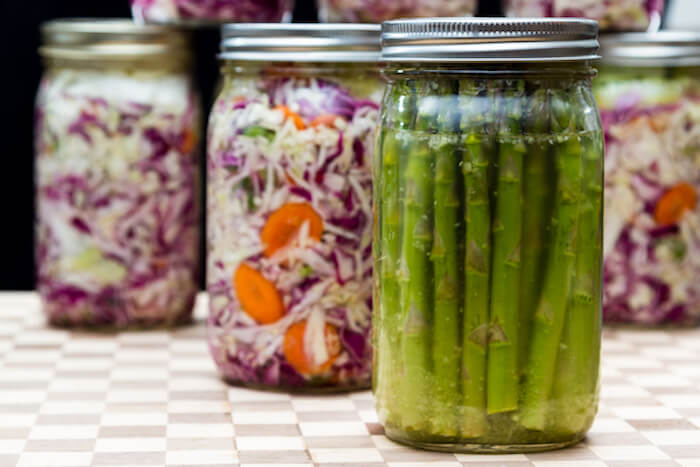
FERMENTED FOODS TO INCLUDE IN YOUR DIET
There is a wide range of fermented foods that you can experiment with and choose among—to boost your probiotic intake. Just two or three bites of any one of these foods, in one or two meals daily, will meet your body’s probiotic needs.
The only potentially tricky part is to make sure that store-bought items actually do include “live active cultures.” There are quite a few yogurt and sour cream brands, for instance, that actually do not include live cultures. So check the label, before adding it to your cart!

That said, here are some of the foods and beverages that can provide excellent probiotic benefits:
1. Fermented soy products: e.g. tempeh, miso, or natto
Tempeh is a great meat substitute. Miso paste can be made into a delicious soup. Natto is more of an acquired taste … but great for the adventurous!
2. Cultured dairy products: e.g. yogurt, lassi (an Indian yogurt drink), sour cream, buttermilk, or cottage cheese
As mentioned above, be sure to choose brands that have “live active cultures.”
3. Kefir—a fermented drink
Kefir is available in a milk or a coconut-water base, in a wide variety of flavors.

4. Cultured vegetables: e.g. pickles, sauerkraut or kimchi (Korean fermented vegetables)
If so inclined, you can also make your own kimchi, pickles or sauerkraut.
5. Raw cheese
Cheeses that are made with milk that hasn’t been pasteurized are another great source of probiotics.
6. Kombucha
Kombucha is a fermented health drink, that’s a fantastic substitute for beer or soda. As with cultured dairy products or veggies, be sure to check the label to make sure that your brew is authentic, i.e. that it contains “live active cultures.”
Get your free Kombucha DIY Guide ==>
GET CULTURED!
By including cultured foods in your daily diet, you ensure that the friendly bacteria of your microbiome receive the nutrients that they need to thrive. This, in turn, provides vital support to both the digestive and immune systems. Keeping the microbiome healthy also supports ongoing detoxification, and naturally regulates appetite—so what we crave are foods that are genuinely healthy.
So, in loving support of your precious human body-mind, and without further ado …. get cultured!
YOU MAY ALSO LIKE:
THE FAT BURNING, BRAIN BOOSTING BENEFITS OF INTERMITTENT FASTING
By Essie Johnson The first time I read about Intermittent Fasting (IF) I thought no, positively, absolutely not, I have no…
ALL YOU NEED TO KNOW ABOUT CUCUMBERS
Did you know that cucumbers are one of the oldest cultivated vegetables? They have been cultivated since about 8,000 BC. You…
GINGER: MIRACLE ROOT THAT YOU NEED IN YOUR DIET
Everyone’s heard of ginger before. It’s a common cooking ingredient, a great way to add flavor to meals, but ginger (also…
IS MORINGA REALLY A “MIRACLE TREE”?
Moringa Oleifera is one of the most commonly cultivated species of the Moringaceae family. It’s also known as the drumstick tree…
MORE THAN JUST A PRETTY FLOWER – BENEFITS OF ROSE ESSENTIAL OIL
Historically, rose essential oil goes back to ancient Egypt, Rome, and Greece. Nowadays, its intoxicating smell, as well as therapeutic properties,…
HOW EXERCISE CAN HELP YOUR JOINTS
By Kevin Jones People who work out tend to focus on goals like burning calories and toning their muscles, often forgetting…

